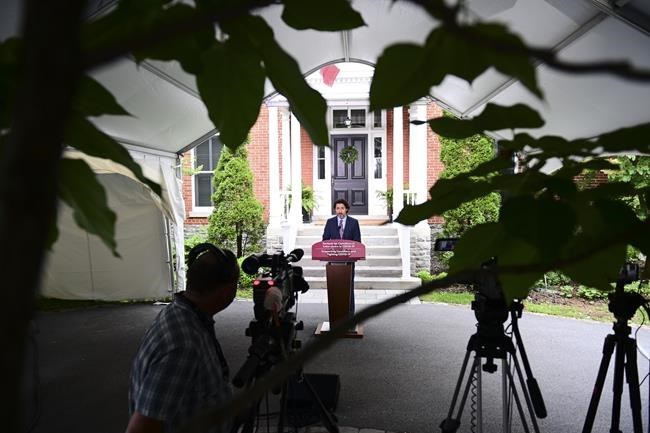OTTAWA — Prime Minister Justin Trudeau says Canada will spend $100 million over the next five years on global projects to address the unequal burden women bear caring for others.
He made the pledge in a speech at the Generation Equality Forum being held in Paris this week, seeking to reverse the outsized impact COVID-19 has had on women and girls.
The forum is looking for global commitments to help restore gender-equality gains lost in the last two years as women around the world faced more sexualized violence, and were forced out of the economy at alarming levels, be it from insecure jobs that were the first to be eliminated in shrinking, closed economies, or because they had to stay home and look after children or elderly relatives.
"The pandemic has shone a strong light on what women and feminists knew for decades, and that is that child-care services are vital," Trudeau said, speaking from Ottawa by video link.
Oxfam Canada executive director Lauren Ravon said Canada is the first country to donate targeted funds to the "care economy," a term to describe work, both paid and unpaid, that involves nurturing and supporting others, including children, the elderly and people who are disabled, and leisure and personal services jobs.
Research has shown much of this work is undervalued and underpaid, if it is paid at all, and falls more often to women, people of colour, new immigrants or temporary foreign workers.
"This is a trailblazing commitment by the Government of Canada and I applaud the government for its bold feminist leadership," Ravon said in a written statement.
She said investing in care jobs "drives economic growth, reduces poverty and inequality, tackles sexist norms and supports gender equality."
Multiple studies have shown women were disproportionately hit by the pandemic's economic wounds, losing more jobs and taking longer to recover. Many women were forced to leave the workforce to care for young children when schools and daycares were shuttered, or to take on extra roles caring for elderly parents or sick relatives, or people with disabilities.
International Development Minister Karina Gould says she thinks employers are far more aware now the critical role care work plays in their own business success.
"I think one of the things that came to light with the pandemic is that we actually value care work in a new way that we didn't pre-pandemic," she said. "We kind of took it for granted. Now, there is an understanding, not just by the women and the caregivers themselves as to how important it is, but also to employers, to society at large."
She says the government is investing $30 billion over the next five years to create a national child-care program with better access and lower fees.
Internationally, she says, Canada is calling for proposals on how to spend $100 million over the next five years on projects that help women who are providing both paid and unpaid care work in developing countries.
This report by The Canadian Press was first published June 30, 2021.
Mia Rabson, The Canadian Press



